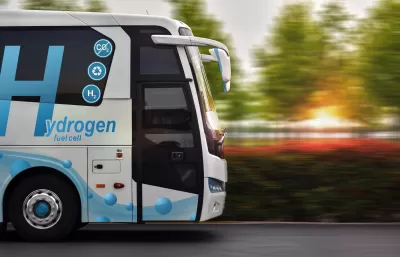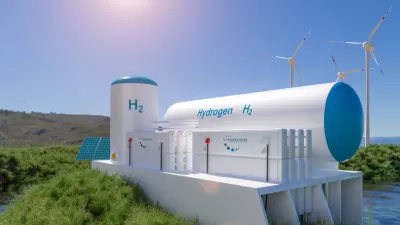More work is necessary to make hydrogen fuel cost competitive with gasoline and diesel and ensure it delivers on its zero-emission promise, new report says.

More work is necessary to make hydrogen fuel cost competitive with gasoline and diesel and ensure it delivers on its zero-emission promise.
A new report from Information Technology and Innovation Foundation (ITIF) concludes hydrogen fuel may not be as feasible as a fossil fuel replacement as previously hoped. Writer Skip Descant summarizes the report’s findings in a recent article for Government Technology.
“In recent years hydrogen has been explored and advocated in much the same fashion as battery-electric technology for cars, trucks, and host of other vehicles,” Descant writes. But its fossil fuel-heavy production methods and complicated storage and distribution network currently make it too expensive to replace gasoline and diesel–and counteract its carbon neutral claims.
Though hydrogen power produces no harmful greenhouse gases (GHG) when it’s used, 98 percent of hydrogen produced today relies on fossil-fuel heavy production methods, according to the ITIF report, titled A Realist Approach to Hydrogen.
“The economies of scaling this type of hydrogen production are currently not feasible, the report concluded,” writes Descant. For hydrogen fuel to reach its full green potential and become price competitive, wind and solar power generation will need to be expanded to the point that they are creating surplus that can be used for hydrogen production, experts say.
The report authors point out their findings should not be taken as a criticism of green energy or denial of climate change. They call for additional research and development of new technologies to make the cost of clean fuels like hydrogen competitive, which they say is crucial for a successful “green transition.”
FULL STORY: Hydrogen Is Still a Heavy Lift for Clean Transportation

Maui's Vacation Rental Debate Turns Ugly
Verbal attacks, misinformation campaigns and fistfights plague a high-stakes debate to convert thousands of vacation rentals into long-term housing.

Planetizen Federal Action Tracker
A weekly monitor of how Trump’s orders and actions are impacting planners and planning in America.

In Urban Planning, AI Prompting Could be the New Design Thinking
Creativity has long been key to great urban design. What if we see AI as our new creative partner?

Pedestrian Deaths Drop, Remain Twice as High as in 2009
Fatalities declined by 4 percent in 2024, but the U.S. is still nowhere close to ‘Vision Zero.’

King County Supportive Housing Program Offers Hope for Unhoused Residents
The county is taking a ‘Housing First’ approach that prioritizes getting people into housing, then offering wraparound supportive services.

Researchers Use AI to Get Clearer Picture of US Housing
Analysts are using artificial intelligence to supercharge their research by allowing them to comb through data faster. Though these AI tools can be error prone, they save time and housing researchers are optimistic about the future.
Urban Design for Planners 1: Software Tools
This six-course series explores essential urban design concepts using open source software and equips planners with the tools they need to participate fully in the urban design process.
Planning for Universal Design
Learn the tools for implementing Universal Design in planning regulations.
planning NEXT
Appalachian Highlands Housing Partners
Mpact (founded as Rail~Volution)
City of Camden Redevelopment Agency
City of Astoria
City of Portland
City of Laramie





























